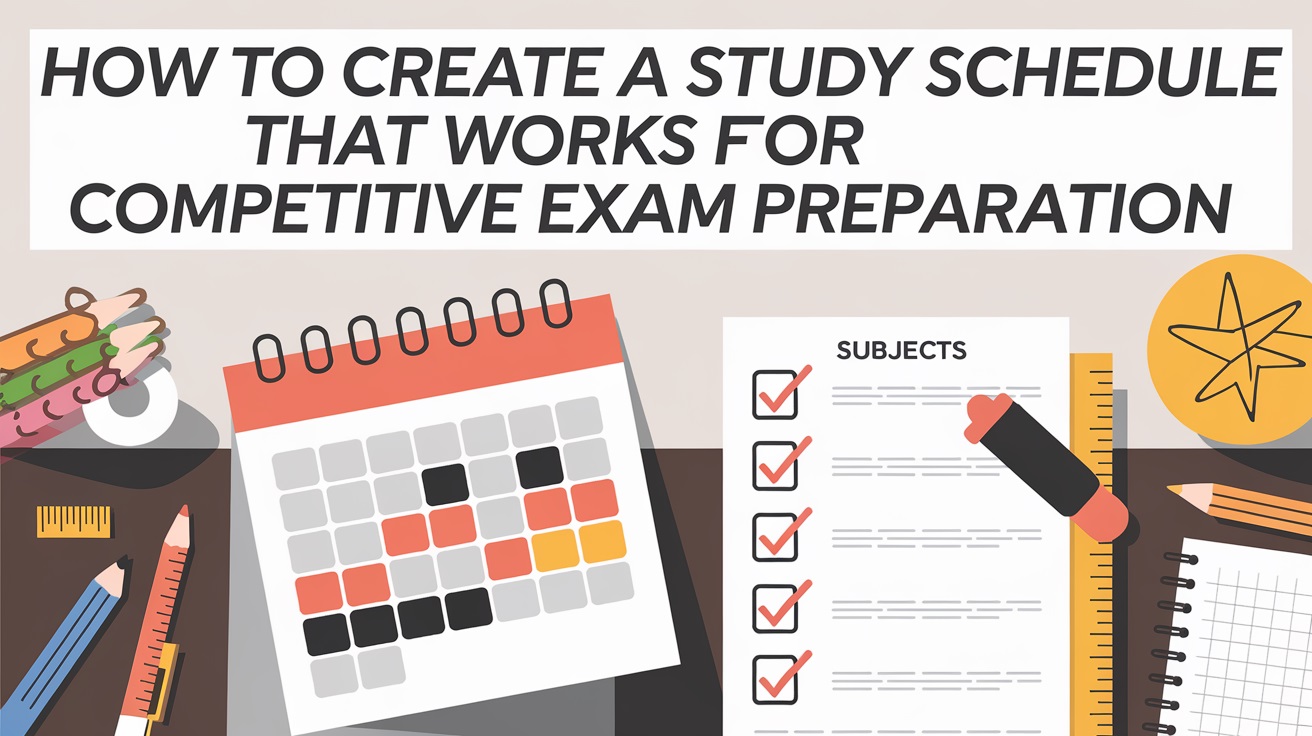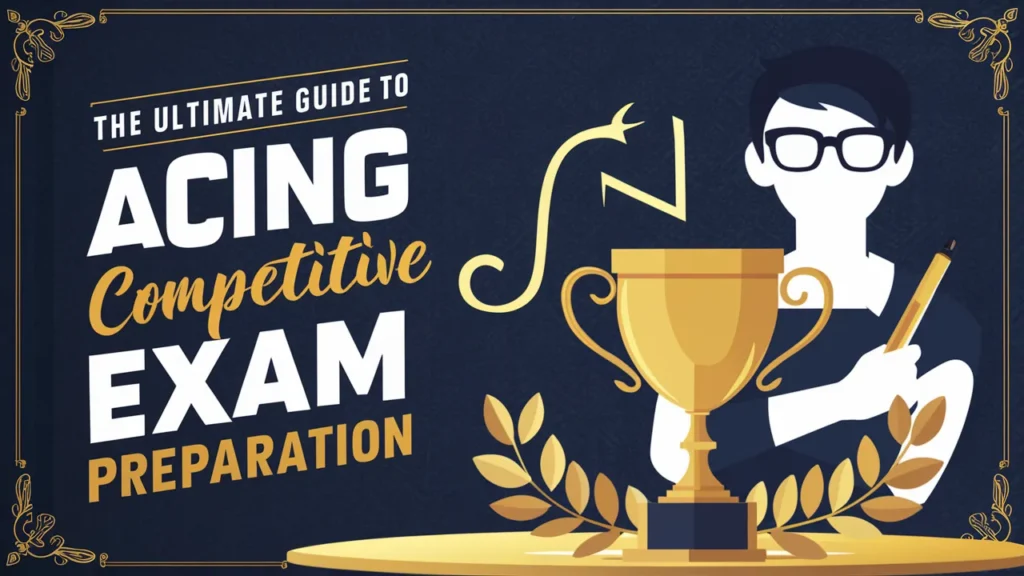
Preparing for competitive exams can be a challenging and overwhelming process, particularly when managing multiple subjects, topics, and deadlines. One of the most effective ways to navigate this complexity is by creating a well-structured study schedule. A study schedule acts as your roadmap, guiding you through your preparation journey while helping you stay organized, focused, and motivated. In this blog, we will explore the key steps to create a study schedule that works for competitive exam preparation.
Why a Study Schedule is Essential
Before diving into the how-to, let’s discuss why having a study schedule is crucial:
- Structure: A study schedule provides a clear structure to your study routine, ensuring that you allocate sufficient time for each subject and topic.
- Time Management: It helps you manage your time effectively, allowing you to balance study with other commitments such as work, family, and leisure.
- Goal Setting: A study schedule enables you to set realistic goals and milestones, giving you a sense of accomplishment as you progress.
- Reduced Stress: With a clear plan in place, you can reduce anxiety related to exam preparation, knowing that you have a roadmap to follow.
Step-by-Step Guide to Creating an Effective Study Schedule
Step 1: Assess Your Current Situation
Before creating your study schedule, it’s essential to assess your current situation:
- Determine Your Exam Dates: Note down the dates of your competitive exams to understand the time frame you have for preparation.
- Identify the Subjects and Topics: List all the subjects you need to study, along with specific topics or chapters within each subject.
- Evaluate Your Current Knowledge: Identify areas where you feel confident and those where you need more work. This assessment will help you allocate your study time effectively.
Step 2: Set Clear Goals
Once you’ve assessed your situation, it’s time to set clear and achievable goals:
- Long-Term Goals: Define what you want to achieve by the end of your preparation period (e.g., mastering certain subjects, completing practice tests).
- Short-Term Goals: Break down long-term goals into smaller, manageable tasks (e.g., completing a chapter each week or taking a mock test every two weeks).
Step 3: Choose Your Study Method
Consider your learning style and preferences when choosing your study methods:
- Visual Learners: Incorporate diagrams, charts, and videos into your study sessions.
- Auditory Learners: Use podcasts, discussion groups, or recorded lectures.
- Kinesthetic Learners: Engage in hands-on activities or practice problems to reinforce learning.
Step 4: Allocate Study Time
With your goals and study methods in mind, it’s time to allocate specific study times:
- Daily Study Blocks: Determine how many hours you can realistically dedicate to studying each day. Be mindful of your energy levels and peak productivity times.
- Balanced Distribution: Distribute your study time across subjects based on your comfort level and exam dates. Allocate more time to challenging subjects and less time to areas where you are already strong.
Step 5: Create a Detailed Study Schedule
Now that you have all the necessary information, it’s time to create your study schedule:
- Use a Calendar: You can use a physical planner, digital calendar, or a dedicated study app to create your schedule.
- Weekly Breakdown: Create a weekly schedule that outlines what subjects you will study each day. Include specific topics, study methods, and time blocks for each session.
- Incorporate Breaks: Don’t forget to include regular breaks in your schedule. Short breaks during study sessions can enhance focus and prevent burnout. Consider using techniques like the Pomodoro Technique (25 minutes of focused study followed by a 5-minute break).
Sample Weekly Study Schedule
| Day | Subject | Topics/Tasks | Study Method |
|---|---|---|---|
| Monday | Mathematics | Algebra, Quadratic Equations | Practice Problems |
| Tuesday | Science | Physics, Laws of Motion | Concept Maps |
| Wednesday | English | Grammar, Vocabulary | Flashcards |
| Thursday | History | World War II, Independence Movements | Note-taking |
| Friday | Mock Tests | Full-Length Test | Timed Practice |
| Saturday | Review | Revise Key Concepts | Group Discussion |
| Sunday | Rest | Leisure Activities | Relax |
Step 6: Monitor Your Progress
Creating a study schedule is just the beginning. To ensure effectiveness, you need to monitor your progress:
- Weekly Reviews: At the end of each week, review what you’ve accomplished. Are you on track to meet your goals?
- Adjust as Necessary: Don’t be afraid to adjust your schedule if you find certain topics require more time or if unexpected events occur. Flexibility is key.
Step 7: Stay Committed and Motivated
Staying committed to your study schedule can be challenging. Here are some tips to maintain motivation:
- Set Up Rewards: Treat yourself to small rewards after completing study goals, such as a favorite snack or a short break to watch a show.
- Study with Peers: Join a study group to keep your motivation high. Discussing topics with others can enhance understanding and make studying more enjoyable.
- Visualize Success: Keep your end goals in mind and visualize yourself achieving success on exam day.
Step 8: Take Care of Yourself
Don’t forget to take care of your physical and mental well-being during your preparation:
- Healthy Lifestyle: Maintain a balanced diet, exercise regularly, and get adequate sleep to keep your mind sharp.
- Stress Management: Practice stress-relief techniques such as mindfulness, yoga, or deep breathing exercises to help manage anxiety.
Conclusion
Creating a study schedule that works for competitive exam preparation is essential for success. By assessing your situation, setting clear goals, allocating study time effectively, and monitoring your progress, you can navigate the challenges of exam preparation with confidence.
Remember, flexibility and adaptability are key. Your study schedule should evolve with your needs and learning pace. With determination and a structured approach, you’ll be well on your way to achieving your competitive exam goals.


